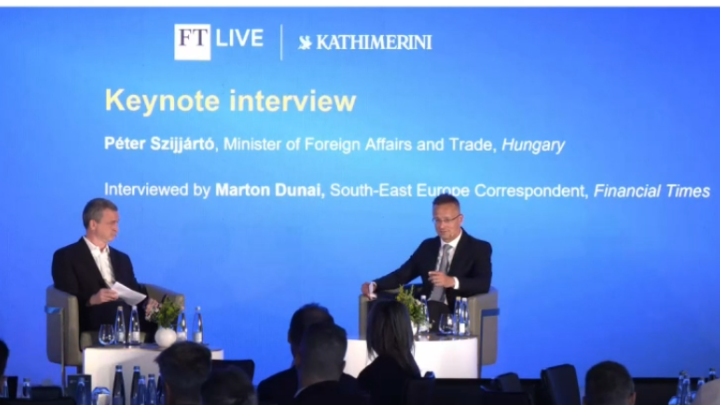Energy Transition Summit- Hungarian FM: We will not sacrifice our energy security for ideologies

Outlining the pressures, challenges, and priorities facing Hungary in the energy transition, Hungarian Foreign Minister Péter Szijjártó stressed that Russia remains his country's most reliable energy supplier and that it will not sacrifice energy security for the sake of political expediency. The minister was speaking in a press conference given at the Financial Times and Kathimerini Energy Transition Summit: East Med & South East Europe taking place in Athens on Wednesday.
Specifically, Szijjártó explained that Hungary treats energy as a purely natural issue, governed by geography and infrastructure, and that this approach guides the government's decisions-independent of political or ideological imperatives.
"The decision for Russia to remain our most reliable energy supplier is based on empirical facts, not political preferences," he clarified. He noted that a prior agreement with a U.S. supplier to import gas from Romania collapsed due to investor withdrawal.
He also warned that the EU’s RePower EU initiative, aimed at reducing dependency on Russian energy, threatens Hungary’s energy security. He said efforts to diversify failed to garner EU support, with infrastructure proposals in the region being rejected. While there are interconnections with Croatia, the gas transmission capacity from Croatia to Hungary remains limited.
"Those opposing our approach fail to appreciate the geophysical and infrastructural realities of the region," Szijjártó stressed.
He also emphasised that the priority of his government is to ensure energy security and maintain low prices for households. To achieve this, he said, Hungary will continue investing in nuclear energy, and will pursue diversification of energy sources where economically feasible and realistic. Additionally, despite difficult conditions, Hungary continues supplying electricity to Ukraine, contributing to the region’s energy security
Regarding the green transition, Szijjártó stated that his country approaches the matter realistically rather than ideologically.
"We have managed to increase GDP while reducing emissions, and we are moving ahead with constructing new nuclear reactors that will reduce dependence on natural gas, while also investing in e‑mobility and battery production," he underlined.
Finally, he described the regional cooperation with neighbouring Central and Southeast European countries as successful, built on mutual respect, realism, and common interests.
"In conclusion, Hungary approaches the energy transition guided by security and economic realities, seeking diversification-but without sacrificing access to reliable and affordable energy sources."
For on camera statements:
https://www.amna.gr/video-services/544358/Corporate%20Videos (YouTube)
https://www.youtube.com/@AMNAwebTV (YouTube)
https://we.tl/YlDOktCGSn

